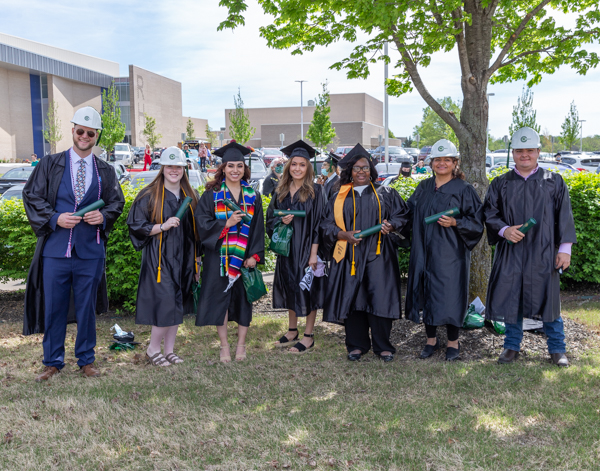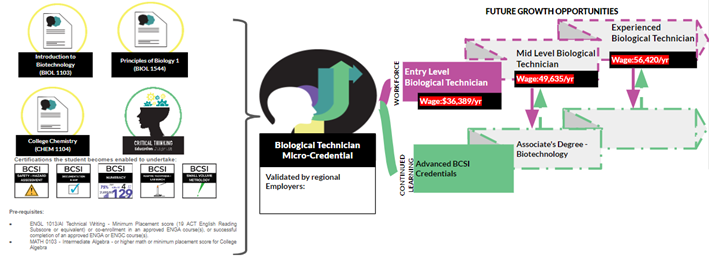Main Content Start

Micro-Credential
Biological Technician
Biological Technician
DESCRIPTION
The Biological Technician micro-pathway prepares learners to assist biological and
medical scientists. The student learns to set up, operate, and maintain laboratory
instruments and equipment, monitor experiments, collect data and samples, make observations,
calculate and record results, and ensure compliance with safety protocols. Biological
technicians also document findings and may assist in developing new products or processes.
They work in various fields, including healthcare, pharmaceuticals, environmental
science, and agriculture.
Instruction Method
In Person
Skills Acquired
- Knowledge of concepts in modern molecular biotechnology
- Knowledge of DNA science and genetic engineering
- Proficiency in Laboratory Techniques
Course Names and Codes
To earn this credential, the following courses must be successfully completed.
Introduction to Biotechnology (BIOL 1103)Principles of Biology I (BIOL 1544)
College Chemistry (CHEM 1104)
Durable Skills Awarded
Critical Thinking
Pre-requisites
Intermediate Algebra (MATH 0103)
English Composition I (ENGL 1013)
Credits Earned
11 Academic Credits towards Associate degree in Biotechnology
Shortest Time to completion
4 Months Full Time
Industry Certification for which the student becomes eligible
Essential Five Micro-Credentials offered by the Bioscience Core Skills Institute(BCSI)
Biological Technician Micro-pathway

Learning Outcomes
Upon completion of the Biological Technician course, students will be able to:
- Understand and Explain Cellular Mechanisms: Articulate the central dogma of molecular biology, detailing DNA's structure and function as a genetic code, and analyze its implications for biotechnology.
- Chemical Principles: Demonstrate a comprehensive understanding of cell structure and function, the chemistry of life, and the principles of inheritance and evolution as they relate to genetic technology.
- Periodic Table Knowledge: Identify elements and their classifications on the periodic table, understand periodic trends, and determine electron configurations.
- Predict Chemical Compounds: Predict formulas for molecular and ionic compounds, balance chemical equations, classify reactions, and perform stoichiometric calculations.
- Molecular Geometry: Draw Lewis structures, predict molecular and electronic geometries, and assess molecular polarity.
- Safety and Protocols: Document and adhere to the established protocols for the proper handling of biological materials and genetically engineered organisms, ensuring compliance with safety regulations.
- Genetic Modification Processes: Describe and apply the methodologies involved in genetically modifying organisms, along with their real-world applications.
- Plasmid Design: Utilize principles of synthetic biology to design and construct a plasmid, demonstrating an understanding of genetic engineering techniques.
- Assess Genetic Changes: Evaluate the potential impacts of alterations to the genetic code at the cellular, organismal, and population levels.
- Data Evaluation: Critically analyze and interpret data from genomic, transcriptomic, and proteomic databases in relation to biotechnological applications.
- Interdependence of Life: Describe the interdependence of organisms and their environments, linking course concepts to personal, community, and global issues.
- Scientific Record Keeping: Exhibit competence in maintaining accurate and thorough scientific laboratory records throughout experiments.
- Critical Thinking and Communication: Formulate a hypothesis, collect and analyze data, draw conclusions, and effectively communicate findings through written and verbal presentations.
Partner Employers
- TBD
- TBD
- YOU!